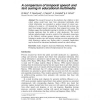Free Online Productivity Tools
i2Speak
i2Symbol
i2OCR
iTex2Img
iWeb2Print
iWeb2Shot
i2Type
iPdf2Split
iPdf2Merge
i2Bopomofo
i2Arabic
i2Style
i2Image
i2PDF
iLatex2Rtf
Sci2ools
JCAL
2002
2002
A comparison of temporal speech and text cueing in educational multimedia
This research focused on the prediction that children in their school setting would learn more from educational multimedia when critical information was presented as spoken instead of textual cues. Analyses of a study (n = 42) showed that 12-year-olds did not learn any more from temporal speech cueing than from temporal text cueing. The findings suggest that multimedia learning for children is a different kind of learning experience than for adults or older adolescents. The results indicate underdeveloped executive control of the referential connections in the children's working memory between reading screen text while listening to spoken cues, and between watching on-screen animations play while listening to spoken cues. Further study is warranted. Implications may be derived for educational multimedia research in school settings.
| Added | 22 Dec 2010 |
| Updated | 22 Dec 2010 |
| Type | Journal |
| Year | 2002 |
| Where | JCAL |
| Authors | Bruce L. Mann, P. Newhouse, J. Pagram, A. Campbell, H. Schulz |
Comments (0)

